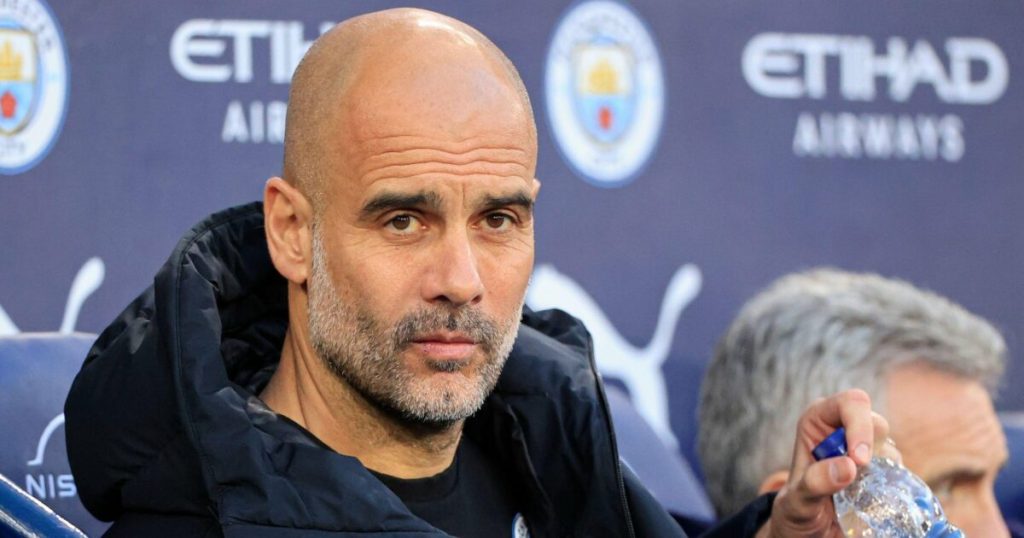Pep Guardiola, the esteemed manager of Manchester City, has issued a stark ultimatum to the club’s hierarchy: maintain a smaller, more manageable squad or face his departure. Guardiola’s philosophy centers on ensuring every player feels valued and has a genuine opportunity to contribute. He expressed deep discomfort with the prospect of sidelining players, deeming it unfair and detrimental to their morale and development. This principled stance reflects Guardiola’s unwavering commitment to fostering a cohesive and competitive environment where every individual feels integral to the team’s success. His declaration underscores his belief that a bloated squad breeds discontent and ultimately undermines the collective spirit necessary for achieving peak performance. He argues that a smaller, tightly-knit group, where each player understands their role and has a realistic chance of playing time, fosters a stronger sense of unity and purpose, thus maximizing the team’s potential.
Guardiola’s ultimatum comes at a critical juncture for Manchester City, a club accustomed to success. Their recent loss to Crystal Palace in the FA Cup final, effectively ending their hopes of a major trophy this season, has undoubtedly added to the pressure. While the club’s Premier League status remains secure, the fight for Champions League qualification intensifies. This pursuit of a top-four finish has heightened the stakes and brought Guardiola’s squad management philosophy into sharper focus. The manager’s insistence on a smaller squad size aligns with his strategic vision for the team, emphasizing the importance of quality over quantity. He believes a leaner squad allows for more focused training, greater tactical cohesion, and a stronger sense of shared purpose. This approach, he contends, is crucial for navigating the demanding schedule of the Premier League and competing at the highest level in European competition.
The manager’s rationale for a smaller squad extends beyond mere tactical considerations. He emphasizes the human element, expressing a deep aversion to leaving players on the bench, feeling it undermines their professional aspirations and personal well-being. This empathy for his players highlights Guardiola’s holistic approach to management, recognizing that a player’s psychological state is as crucial as their physical condition. He understands that a player’s motivation and performance are inextricably linked to their sense of belonging and their belief that they have a meaningful role to play. Therefore, a smaller squad, where every player feels valued and has a realistic chance of contributing, creates a more positive and productive environment, ultimately benefiting the entire team.
Manchester City’s current predicament, battling for a Champions League spot, further underscores the significance of Guardiola’s demand. With the remaining fixtures of the season being crucial, Guardiola believes a streamlined squad is essential for maintaining focus and maximizing performance. He argues that a larger squad, with its inherent risk of player dissatisfaction and disharmony, could derail their Champions League ambitions. A smaller, more cohesive unit, on the other hand, allows for greater tactical flexibility, sharper focus, and stronger team spirit – all critical factors in high-stakes matches. This emphasis on a smaller, more tightly-knit group reinforces Guardiola’s belief in the power of collective effort and shared purpose.
Guardiola’s ultimatum places Manchester City’s management in a challenging position. Balancing the manager’s desire for a smaller squad with the club’s broader ambitions and financial considerations requires careful navigation. While Guardiola’s track record of success speaks for itself, his demands could potentially impact the club’s transfer strategy and long-term planning. However, the club’s hierarchy must carefully weigh the potential consequences of ignoring the manager’s wishes, recognizing that his departure could have significant repercussions for the team’s performance and overall stability. Finding a solution that satisfies both the manager’s principles and the club’s long-term interests will be a crucial test of their collaborative relationship.
The ultimate outcome of this stand-off remains uncertain. Whether Manchester City’s board accedes to Guardiola’s request or holds its ground will significantly shape the club’s future. This situation highlights the delicate balance between a manager’s vision and a club’s broader strategic goals. It underscores the complexities of managing a top-tier football club, where sporting ambition, financial realities, and individual personalities intersect. The resolution of this impasse will not only determine Guardiola’s future at the club but also influence the trajectory of Manchester City’s pursuit of continued success on the domestic and European stage.














